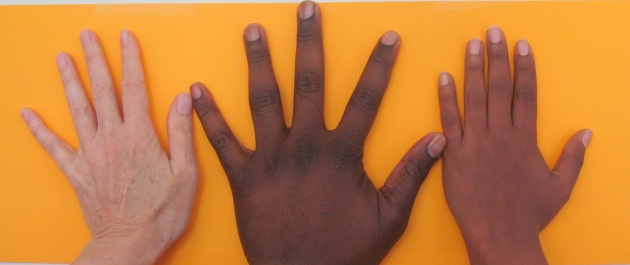«Le bénévolat m’a permis d’obtenir une bourse pour suivre la formation d’Auxiliaire de santé de la Croix-Rouge»
Faute de pouvoir travailler, Timaj, jeune Ethiopienne de 32 ans à l’aide d’urgence, a décidé de s’investir dans le bénévolat. Depuis trois ans, elle offre son aide, sa patience et son sourire pour alléger le quotidien de personnes âgées et handicapées. Si, au bout du compte, son porte-monnaie est toujours aussi léger, Timaj ne regrette rien, car ses activités de bénévole constituent autant d’occasions pour faire des rencontres, se former, pratiquer cette langue ardue qu’est le français et pour mieux comprendre les codes et les usages en vigueur dans la culture suisse. Interview.
Voix d’Exils : Timaj, raconte-nous tes débuts de bénévole…
Timaj : Je suis arrivée en Suisse en 2009 et j’ai posé une demande d’asile. J’ai été déboutée début 2011. Je ne pouvais donc ni travailler ni suivre une formation. Alors je suis devenue bénévole à l’hôpital d’Orbe et à la Fondation Pro-XY, qui organise une aide à domicile pour les personnes âgées.
En quoi consiste le bénévolat en milieu hospitalier ?
J’ai été bénévole à l’hôpital d’Orbe, de septembre 2011 à juillet 2014. Je participais aux activités d’animation destinées aux résidents et aux personnes qui passent la journée au CAT, le Centre d’Accueil Temporaire. Je travaillais les mardis après-midi en binôme avec une animatrice professionnelle pour donner les cours de gymnastique douce. Et puis je servais le repas de midi, j’aidais les personnes à manger et à couper la nourriture quand c’était nécessaire.
Cela représentait beaucoup de temps?
Je travaillais deux fois trois heures par semaine, une fois l’après-midi et une fois le matin.
Et chez Pro-XY ?
Chez Pro-XY, je m’occupe depuis 2011 de Janine, qui a 88 ans. Je vais chez elle une fois par semaine, le samedi. J’arrive à 11:00, je l’accompagne faire les commissions, puis je l’aide à préparer le repas et nous mangeons ensemble. Quand elle fait la sieste, je range la cuisine, et ensuite on va faire une promenade en ville d’Yverdon. Une fois, on a pris le bateau pour aller jusqu’à Neuchâtel.
Selon toi, quelles sont les qualités nécessaires pour être bénévole ?
Il faut avoir l’envie de donner du temps, d’aider les gens qui sont en difficulté, qui sont seules. Il faut aussi être motivé car il y a des difficultés qui sont dues à la différence de langue et aux différences socio-culturelles. Plusieurs fois j’ai commencé la séance de gymnastique douce alors que l’animatrice n’était pas encore là, et je n’arrivais pas à bien le faire car je suis timide, je ne me sens pas à l’aise quand je dois me mettre en avant. C’est dans ma culture…
Quelle est la place du bénévole au sein d’une équipe soignante ?
Les infirmières, les aides-soignantes et les animatrices sont très occupées : elles doivent aider les personnes âgées à descendre à la salle à manger et les installer pour le repas, les aider à manger, débarrasser la table et les remonter dans leur chambre pour la sieste. C’est beaucoup de travail! Donc, pour les personnes âgées et pour le personnel soignant, c’est précieux de bénéficier de l’aide des bénévoles.
Que t’a apporté et t’apporte encore le bénévolat?
Tout d’abord, j’apprécie de pouvoir communiquer avec les gens d’ici, d’avoir des contacts, de progresser dans mon apprentissage de la langue française. Ensuite, je ressens une grande satisfaction de pouvoir être utile aux autres. J’étais la seule Africaine dans l’équipe à l’hôpital mais les gens m’ont bien acceptée. J’ai aussi beaucoup apprécié les réunions avec les responsables de l’hôpital une fois par année. Cela me permettait de partager l’expérience des professionnels. J’étais aussi invitée au souper annuel du regroupement des hôpitaux vaudois.
Ces expériences t’ont-elles permis de progresser sur un plan professionnel ?
Oui, être bénévole m’a permis de suivre différentes formations proposées par l’association faîtière Bénévolat-Vaud, comme par exemple «L’introduction à l’engagement bénévole», «L’accompagnement en fin de vie», «Les Premiers secours». Le bénévolat m’a apporté une expérience de travail, et m’a permis d’obtenir une bourse de la Fondation Envol pour payer le cours d’Auxiliaire de santé de la Croix-Rouge. J’ai obtenu le certificat fin 2013.
Quels sont les côtés moins sympathiques?
Une fois que tu n’es plus bénévole, tu perds le contact avec les personnes que tu as côtoyées. En juillet 2014, je suis devenue rédactrice à Voix d’Exils et j’ai arrêté le bénévolat à l’hôpital d’Orbe. Comme je ne vais plus à l’hôpital, je ne vois plus mes anciens collègues ni les personnes âgées dont je me suis occupées.
Recommanderais-tu le bénévolat aux requérants d’asile?
Oui! Cela permet de communiquer avec les gens, de s’intégrer, de développer la langue et d’entrer dans le système. Et l’intégration, ça compte pour obtenir l’asile! Même si le bénévole ne reçoit pas de salaire, il peut vivre une expérience professionnelle et humaine très riche. Il n’y a pas que dans les soins… On peut faire du bénévolat dans beaucoup de domaines différents. En tant que requérant, on arrive en Suisse les poches vides, il faut les remplir avec de nouvelles expériences !
Propos recueillis par
La rédaction vaudoise de Voix d’Exils


